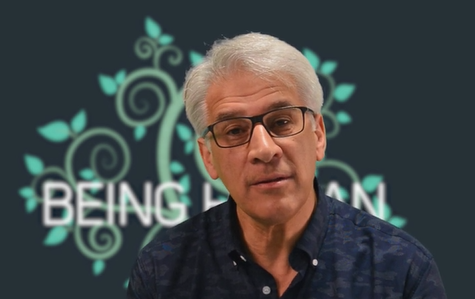A Baptist minister and author who shocked British evangelicals when he came out in support of same-sex marriage in 2013 now says Christians talk too much about Original Sin and not enough about humanity’s inherent goodness and worth.
Steve Chalke, founder of the Oasis Trust, says in a new video resource that the message that humans are inherently bad isn’t the only way to interpret the story of Adam and Eve’s disobedience in the Garden of Eden as told in Genesis 3.
“Jewish scholars throughout the years, through the centuries, through the millennia, have simply said this: This story is about the growing up of humanity,” Chalke says in the first of four studies based on his 2015 book Being Human: How to become the person you were meant to be.
Adam and Eve “moved from innocence into knowledge, and as they are tempted and they eat of this fruit, they become aware of themselves in a new way.”
Chalke says Western Christianity derived the idea of inherited sin from writings of the Apostle Paul as read for centuries primarily through the theological lens of Augustine of Hippo, an early Christian theologian and philosopher venerated by the Roman Catholic Church as a saint.
He says Augustine’s thought was shaped not only by the prevailing Western philosophies of his day, but also by personal shortcomings in his own life prior to his conversion to Christianity at age 31.
“Augustine came to believe that Adam’s sin transformed human nature,” Chalke says. “All of us are his descendants, and we live in sin from birth. That sin was transmitted into us through sexual reproduction. From our very birth in our nature we are guilty, and there is nothing we can do to escape our guilt, except through God’s grace.”
Both Jewish and Christian Bibles include the Book of Genesis, Chalke says, but the two traditions read the stories in different ways.
“Jewish scholars say that the story is about the growth of humanity from innocence to knowledge,” he says, “the growth of humanity to the place where we are tempted and we have to constantly make good or bad decisions.”
“They say that it’s the story of the growth of the whole of humanity to maturity, but it’s also the story of individual growth to maturity as we leave behind childhood and we become aware of temptation and we become aware of the battle to choose the right road and not the wrong road.”
Chalke also says the common idea that Adam and Eve’s sin brought death into the world “can’t be right,” because the story says the reason God removed the couple from the garden was to prevent them from eating from the tree of life and thereby become immortal, implying that they were going to die anyway.
“The story of Adam and Eve is what’s called a myth,” Chalke says. “That doesn’t mean it’s not truthful. It means that it teaches great truth, just like Jesus’ parables, the story of the prodigal son didn’t really happen. No, it’s a great story to teach us great truth.”
Chalke says all cultures use myths to pass on collective wisdom. “We tell the story of the hare and the tortoise,” he says. In the case of Genesis, he adds, “Here is a great story, a myth, that teaches us things about who we are, what our destiny is and calls us to follow in Christ’s way.”
Chalke says the story of Adam and Eve eating forbidden fruit in the third chapter of Genesis doesn’t mention Original Sin, and it doesn’t say explicitly that the serpent is Satan. He also reminds that the story doesn’t begin with Genesis 3 but rather Genesis 1, where humans are described as the crowning achievement of a creation that God declares “very good.”
“Genesis chapter 3, the story that we’ve been told is about Original Sin, turns out to be, in the view of Hebrew scholars down through the ages, not about that at all but about our journey to discover how to live well: to make good moral choices, to learn to resist the temptation and consequences of living badly,” he says. “We are made originally good.”
Four years ago Chalke was the first prominent evangelical in the UK to speak out in support of faithful and monogamous same-sex relationships, sparking a debate within the Baptist Union of Great Britain that continues today.
That wasn’t his first brush with controversy, however. He lost speaking engagements over a book he co-authored in 2003, The Lost Message of Jesus, in which he rejected the doctrine of penal substitutionary atonement, comparing the predominant view held by Protestants today to cosmic child abuse.
Related stories:
Satisfaction guaranteed: Southern Baptists refute efforts to soften the atonement
Atonement tweet sparks blood feud on social media
UK Baptist minister affirms gays
British Baptists debate gay marriage
Related opinion:
The Cross is not enough: Baptists, catholicity and the atonement | Curtis Freeman & Steve Harmon
Violence, atonement and racism | Steve Harmon & Curtis Freeman
Enough ‘Virgin in the Volcano’ theology | Jim Somerville
It’s time to end the hands-off attitude to substitionary atonement | Chuck Queen



